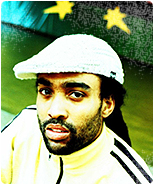|
|
 |
 The Street from Lagos to Cologne: Finding Fuji Satisfaction in NiGerman Hip Hop
The Street from Lagos to Cologne: Finding Fuji Satisfaction in NiGerman Hip Hop
This AfroPean, NiGerman story begins with Japan’s mighty Mount Fujiama, passes through ruthless murders, and ends on a Pan-Africanist dancefloor with a mission. The artist is Bantu a.k.a Adé Bantu, joined by Ayuba, a.k.a. Adewale Ayuba. The two collaborated to create Fuji Satisfaction on Piranha Musik.
Fuji is a popular style of music in Nigeria, with roots in the old style of Nigeria’s Muslim Yoruba people. On Fuji Satisfaction, the form—which was named after the Japanese mountain, in honor of the symbolism representing love, unity, and brotherhood—reaches a new level with relentless lyrics and beats from hip hop, reggae, and afrobeat. Fuji is the perfect brand name for the fast-paced sound from the streets of Lagos, Nigeria. The music is a synthesis of all that is blending on the African continent today: Arabesque Islamic singing playfully competing with Western guitar and organ sounds over heavy polyrhythmic Yoruba drumming.
A pioneer of the German hip hop movement from the start, Adé named his musical collective Bantu for a few reasons. In Yoruba, the phrase “é ban tu” means to untie. The name honors the martyred anti-apartheid leader Steve Biko who was of Bantu origin. And finally Bantu stands for Brotherhood Alliance Navigating Towards Unity.
Born to a German mother and a Nigerian father in England, Adé relocated to Cologne, Germany in recent years. Adé was almost 16 years old when his father was murdered by armed robbers. He speaks of the therapeutic importance of music, “food for the soul.” He unites his multicultural influences both sonically and politically, both personally and publicly.
His spicy AfroPean stew is a natural blend of the most converse elements of both continents’ traditions. Drawing from his forefathers’ roots and his experience of the African diaspora alike, he uses the variety of urban styles and sounds to contribute another shade to the soundtrack of a global Africa: profoundly rooted in Yoruba history yet dripping with Western production standards, deeply sensual yet utterly spiritual, thoroughly individual yet highly political.
The political aspect was exercised effectively with AfroGerman musical pressure group Brothers Keepers. The all-star ensemble, masterminded by Adé Bantu (as he is also known), combines artistic versatility with a clear political statement. It takes the most outspoken stand against racist violence in the country yet. And they took it right into the mainstream, to the very top of the German charts.
Adewale Ayuba is the master of Nigeria’s next generation of Fuji music. As “Fuji Ambassador” he has started to spread the vibe of West African dancehalls from his Lagos club, Skindles, straight to the Americas, Europe, and beyond. Known for his captivating vocal arrangements and fluent drum patterns, he is particularly famous for his energetic live shows that can last up to seven hours.
All the different shades and colors he almost excessively indulges in during the course of those performances have been jam-packed into his first international collaboration. They are the characteristic Fuji topics, rather explicitly dwelling on secular affairs, love’s mysterious ways, lust, and lubricity. There is the mingling of African and Western instrumentation, inspirationally transforming the seemingly mundane into states far more spiritual and deep.
Finally, the constant reworking and revitalization of all the ingredients—from the ancient rituals of Ayuba’s African heritage to the varying styles and fashions of the West—is an absolute must. For in Fuji philosophy, what has become static has become meaningless.
|
|
 |
|
|
|